- Home
- Gore Vidal
At Home
At Home Read online
BOOKS BY GORE VIDAL
NOVELS
Williwaw
In a Yellow Wood
The City and the Pillar
The Season of Comfort
A Search for the King
Dark Green, Bright Red
The Judgment of Paris
Messiah
Julian
Washington, D.C.
Myra Breckinridge
Two Sisters
Burr
Myron
1876
Kalki
Creation
Duluth
Lincoln
Myra Breckinridge and Myron
Empire
PLAYS
An Evening with Richard Nixon
Weekend
Romulus
The Best Man
Visit to a Small Planet
SHORT STORIES
A Thirsty Evil
ESSAYS
Rocking the Boat
Reflections upon a Sinking Ship
Homage to Daniel Shays
Matters of Fact and of Fiction
The Second American Revolution
FIRST VINTAGE BOOKS EDITION, JANUARY 1990
Copyright © 1982, 1983, 1984, 1985, 1986, 1987, 1988 by Gore Vidal
All rights reserved under International and Pan-American Copyright Conventions. Published in the United States by Vintage Books, a division of Random House, Inc., New York. Originally published in different form, in Great Britain by André Deutsch Limited in 1987.
This edition was originally published, in hardcover, by Random House, Inc., in 1988.
Library of Congress Cataloging-in-Publication Data
Vidal, Gore, 1925-
At home : essays, 1982–1988 / Gore Vidal.—1st Vintage Books ed.
p. cm.
Originally published in different form in Great Britain by A.
Deutsch Ltd., 1987, under title: Armageddon?
ISBN 0-679-72528-8
I. Vidal, Gore, 1925- Armageddon? II. Title.
[PS3543.I26A89 1990]
814’.54—dc20 89-40155
CIP
Ebook ISBN 9780525565833
All the essays in this work have previously appeared in The New York Review of Books, The Nation, Newsweek, Esquire, Vanity Fair, Architectural Digest, and The Times (London) Literary Supplement.
Grateful acknowledgment is made to Black Sparrow Press for permission to reprint “Introduction” by Gore Vidal to Collected Stories of Paul Bowles. Copyright © 1979 by Gore Vidal.
Reprinted by permission of Black Sparrow Press.
v5.3.2
a
PREFACE
As shadows lengthen now across the greensward, in the immortal Pelham Grenville W.’s eldritch phrase, one’s thoughts turn to crepuscular things. Bats flit; bees buzz in bonnets; the millennium, yet again (you can set your clock by it), is at hand, and as the twenty-first century gets ready to welcome us with all manner of good things, let us hope that noisy Armageddon does not intersect too soon our “pale parabola of joy.”
Over the years I have noted with what nervousness writers apologize for collections of random pieces that they have written. They seem to think that a collection of essays ought to have a single numinous theme, like dentistry or the writer’s own sweet self. Since the second does the binding in any case, why not accept the fact that an essay (from the French essai, an attempt) is simply that—an attempt to order one’s impressions and reflections on a given subject? These particular essays (1983–1988) are attempts to salvage from lost time people and places that no longer exist as they once were, or at all. I have done this deliberately (which means unconsciously) because I shall never write a formal memoir (I have never been my own subject, a sign of truly sickening narcissism). In any case, as I write of politics, literature, aviation and my father, I do, occasionally, strike a personal note, in order to give some of the geography, if nothing else, of my own life.
As others have remarked, I am obsessed with my own country, whose high imperial noon (1945–1950) coincided with my own high youth, and though I have deplored our military adventures quite as much as my grandfather did in 1898 when he helped lead the anti-imperialists against the forcible annexation of the Philippine islands, I did not expect the general enterprise to become so seedy and corrupt, or our economic and moral collapse to be so swift. But then William James, in a letter to William Dean Howells (1906), struck the note that still resounds: “Exactly that callousness to abstract justice is the sinister feature and, to me, as well as to you, the incomprehensible feature of our U.S. civilization. When the ordinary American hears of cases of injustice he begins to pooh-pooh and minimize them and tone down the thing, and breed excuses from his general fund of optimism and respect for expediency.” What James would have made of Ronald Reagan is beyond the imaginable. But he did not live in the age of Reagan. I did. Here’s my report.
CONTENTS
Cover
Also by Gore Vidal
Title Page
Copyright
Preface
PART I
1. At Home in Washington, D.C.
2. On Flying
3. Frederic Prokosch: The European Connection
4. Tennessee Williams: Someone to Laugh at the Squares With
5. Richard Nixon: Not The Best Man’s Best Man
6. Hollywood!
7. Ronnie and Nancy: A Life in Pictures
8. Armageddon?
9. The Day the American Empire Ran Out of Gas
10. A Cheerful Response
11. Ollie
12. The National Security State
13. Mongolia!
14. At Home in a Roman Street
PART II
15. The Bookchat of Henry James
16. William Dean Howells
17. The Golden Bowl of Henry James
18. Logan Pearsall Smith Loves the Adverb
19. Oscar Wilde: On the Skids Again
20. Paul Bowles’s Stories
21. Calvino’s Death
22. Why I Am Eight Years Younger than Anthony Burgess
23. Dawn Powell: The American Writer
24. How I Do What I Do If Not Why
Appendix
About the Author
PART I
CHAPTER 1
AT HOME IN WASHINGTON, D.C.
Like so many blind people my grandfather was a passionate sightseer, not to mention a compulsive guide. One of my first memories is driving with him to a slum in southeast Washington. “All this,” he said, pointing at the dilapidated red brick buildings, “was once our land.” Since I saw only shabby buildings and could not imagine the land beneath, I was not impressed.
Years later I saw a map of how the District of Columbia had looked before the district’s invention. Georgetown was a small community on the Potomac. The rest was farmland, owned by nineteen families. I seem to remember that the Gore land was next to that of the Notleys—a name that remains with me since my great-grandfather was called Thomas Notley Gore. (A kind reader tells me that the land-owning Notleys were located elsewhere in Maryland.) Most of these families were what we continue to call—mistakenly—Scots-Irish. Actually, the Gores were Anglo-Irish from Donegal. They arrived in North America at the end of the seventeenth century and they tended to intermarry with other Anglo-Irish families—particularly in Virginia and Maryland.
George Washington not only presided over the war of separation from Great Britain (revolution is much too strong a word for that confused and confusing ope
ration) but he also invented the federal republic whose original constitution reflected his powerful will to create the sort of government which would see to it that the rights of property will be forever revered. He was then congenial, if not controlling, party to the deal that moved the capital of the new republic from the city of Philadelphia to the wilderness not far from his own Virginia estate.
When a grateful nation saw fit to call the capital-to-be Washington City, the great man made no strenuous demur. Had he not already established his modesty and republican virtue by refusing the crown of the new Atlantic nation on the ground that to replace George III with George I did not sound entirely right? Also, and perhaps more to the point, Washington had no children. There would be no Prince of Virginia, ready to ascend the rustic throne at Washington City when the founder of the dynasty was translated to a higher sphere.
Although Washington himself did not have to sell or give up any of his own land, he did buy a couple of lots as speculation. Then he died a year before the city was occupied by its first president-in-residence, John Adams. The families that had been dispossessed to make way for the capital city did not do too badly. The Gores who remained sold lots, built houses and hotels, and became rich. The Gores who went away—my grandfather’s branch—moved to the far west, in those days, Mississippi. It was not until my grandfather was elected to the Senate in 1907 that he was able to come home again—never to leave until his death in 1949.
Although foreign diplomats enjoy maintaining that Washington is—or was—a hardship post, the British minister in 1809, one Francis James Jackson, had the good sense to observe: “I have procured two very good saddle horses, and Elizabeth and I have been riding in all directions round the place whenever the weather has been cool enough. The country has a beautifully picturesque appearance, and I have nowhere seen finer scenery than is composed by the Potomac and the woods and hills about it; yet it has a wild and desolated air from being so scantily and rudely cultivated, and from the want of population….So you see we are not fallen into a wilderness,—so far from it that I am surprised no one should before have mentioned the great beauty of the neighborhood. The natives trouble themselves but little about it; their thoughts are chiefly of tobacco, flour, shingles, and the news of the day.” Plus ça change.
Twenty years ago, that well-known wit and man-about-town, John F. Kennedy, said, “Washington perfectly combines southern efficiency with northern charm.” I think that this was certainly true of the era when he and his knights of the Round Table were establishing Camelot amongst the local chiggers. By then too many glass buildings were going up. Too many old houses were being town down or allowed to crumble. Too many slums were metastasizing around Capitol Hill. Also, the prewar decision to make an imperial Roman—literally, Roman—capital out of what had been originally a pleasant Frenchified southern city was, in retrospect, a mistake.
I can remember that when such Roman palaces as the Commerce Department were being built, we used to wonder, rather innocently, how these huge buildings could ever be filled up with people. But a city is an organism like any other and an organism knows its own encodement. Long before the American empire was a reality, the city was turning itself into New Rome. While the basilicas and porticoes were going up, one often had the sense that one was living not in a city that was being built but in a set of ruins. It is curious that even in those pre-nuclear days many of us could imagine the city devastated. Was this, perhaps, some memory of the War of 1812 when the British burned Capitol and White House? Or of the Civil War when southern troops invaded the city, coming down Seventh Street Road?
“At least they will make wonderful ruins,” said my grandfather, turning his blind eyes on the Archives Building; he was never a man to spend public money on anything if he could help it. But those Piranesi blocks of marble eventually became real buildings that soon filled up with real bureaucrats, and by the end of the Second World War Washington had a real world empire to go with all those (to my eyes, at least) bogus-Roman sets.
Empires are dangerous possessions, as Pericles was among the first to point out. Since I recall pre-imperial Washington, I am a bit of an old Republican in the Ciceronian mode, given to decrying the corruption of the simpler, saner city of my youth. In the twenties and thirties, Washington was a small town where everyone knew everyone else. When school was out in June, boys took off their shoes and did not put them on again—at least outside the house—until September. The summer heat was—and is—Egyptian. In June, before Congress adjourned, I used to be sent with car and driver to pick up my grandfather at the Capitol and bring him home. In those casual days, there were few guards at the Capitol—and, again, everyone knew everyone else. I would wander on to the floor of the Senate, sit on my grandfather’s desk if he wasn’t ready to go, experiment with the snuff that was ritually allotted each senator; then I would lead him off the floor. On one occasion, I came down the aisle of the Senate wearing nothing but a bathing suit. This caused a good deal of amusement, to the blind man’s bewilderment. Finally, the vice president, Mr. Garner—teeth like tiny black pearls and a breath that was all whisky—came down from the chair and said, “Senator, this boy is nekkid.” Afterward I always wore a shirt on the Senate floor—but never shoes.
I date the end of the old republic and the birth of the empire to the invention, in the late thirties, of air conditioning. Before air conditioning, Washington was deserted from mid-June to September. The president—always Franklin Roosevelt—headed up the Hudson and all of Congress went home. The gentry withdrew to the northern resorts. Middle-income people flocked to Rehobeth Beach, Delaware or Virginia Beach, which was slightly more racy. But since air conditioning and the Second World War arrived, more or less at the same time, Congress sits and sits while the presidents and their staffs never stop making mischief at the White House or in “Mr. Mullett’s masterpiece,” the splendid old State, War and Navy building, now totally absorbed by the minions of President Augustus. The Pentagon—a building everyone hated when it was being built—still gives us no great cause to love either its crude appearance or its function, so like that of a wasp’s nest aswarm.
Now our Roman buildings are beginning to darken with time and pigeon droppings while the brutal glass towers of the late twentieth century tend to mask and dwarf them. But here and there in the city one still comes across shaded streets and houses; so many relics of lost time—when men wore white straw hats and suits in summer while huge hats decorated the ladies (hats always got larger just before a war) and one dined at Harvey’s Restaurant, where the slow-turning ceiling-fans and tessellated floors made the hottest summer day seem cool even though the air of the street outside was ovenlike and smelled of jasmine and hot tar, while nearby Lafayette Park was a lush tropical jungle where one could see that Civil War hero, Mr. Justice Oliver Wendell Holmes, Jr., stroll, his white moustaches unfurled like fierce battle pennants. At the park’s edge our entirely own and perfectly unique Henry Adams held court for decades in a house opposite to that Executive Mansion where grandfather and great-grandfather had reigned over a capital that was little more than a village down whose muddy main street ran a shallow creek that was known to some even then as—what else?—the Tiber.
THE NEW YORK REVIEW OF BOOKS
April 29, 1982
CHAPTER 2
ON FLYING
1
I was twice footnote to the history of aviation. On July 7, 1929, still on the sunny side of four years old, I flew in the first commercially scheduled airliner (a Ford trimotor) across the United States, from New York to Los Angeles in forty-eight hours. Aviation was now so safe that even a little child could fly in comfort. I remember only two things about the flight: the lurid flames from the exhaust through the window; then a sudden loss of altitude over Los Angeles, during which my eardrums burst. Always the trouper, I was later posed, smiling, for the rotogravure sections of the newspapers, blood trickling from tiny lobes. Among my supporting c
ast that day were my father, the assistant general manager of the company (Transcontinental Air Transport), his great and good friend, as the never great, never good Time magazine would say, Amelia Earhart, as well as Anne Morrow Lindbergh, whose husband Charles was my pilot.*1 Both Lindbergh and Amelia had been hired by the line’s promoter, one C. M. Keys (not even a footnote now but then known as the czar of aviation), to publicize TAT, popularly known as “The Lindbergh Line.”
My second moment of footnotehood occurred in the spring of 1936, when I was—significantly—on the sunny side of eleven. I was picked up at St. Albans School in Washington, D.C., by my father, Eugene L. Vidal, director of the Bureau of Air Commerce (an appointee of one Franklin D. Roosevelt, himself mere tinkling prelude to Reagan’s heavenly choir). FDR wanted to have a ministry of aviation like the European powers; and so the Bureau of Air Commerce was created.
* * *
On hot spring mornings Washington’s streets smelled of melting asphalt, and everything was a dull tropical green. The city was more like a Virginia county seat than a world capital. Instead of air conditioning, people used palmetto fans. As we got into my implausibly handsome father’s plausible Plymouth, he was mysterious, while I was delighted to be liberated from school. I wore short trousers and polo shirt, the standard costume of those obliged to pretend that they were children a half-century ago. What was up? I asked. My father said, You’ll see. Since we were now on the familiar road to Bolling Field, I knew that whatever was up, it was probably going to be us. Ever since my father—known to all as Gene—had become director in 1933, we used to fly together nearly every weekend in the director’s Stinson monoplane. Occasionally he’d let me take the controls. Otherwise, I was navigator. With a filling-station road map on my bony knees, I would look out the window for familiar landmarks. When in doubt, you followed a railroad line or a main highway. Period joke: A dumb pilot was told to follow the Super Chief no matter what; when the train entered a tunnel, so did the pilot. End of joke.

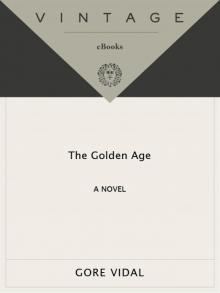 The Golden Age: A Novel
The Golden Age: A Novel Death Before Bedtime
Death Before Bedtime Burr
Burr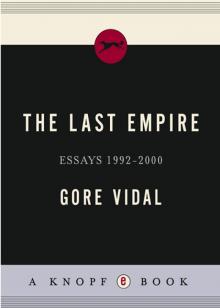 The Last Empire
The Last Empire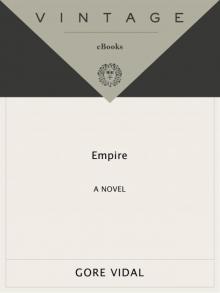 Empire: A Novel
Empire: A Novel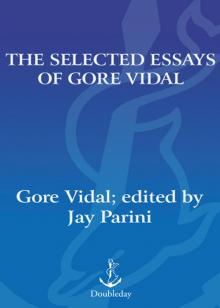 The Selected Essays of Gore Vidal
The Selected Essays of Gore Vidal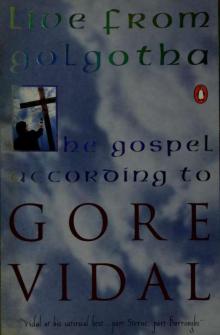 Live From Golgotha
Live From Golgotha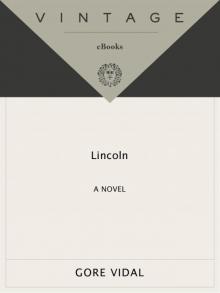 Lincoln
Lincoln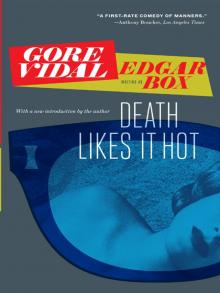 Death Likes It Hot
Death Likes It Hot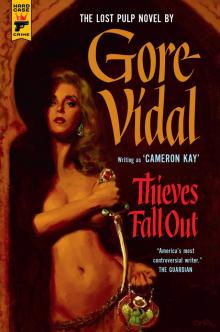 Thieves Fall Out (Hard Case Crime)
Thieves Fall Out (Hard Case Crime)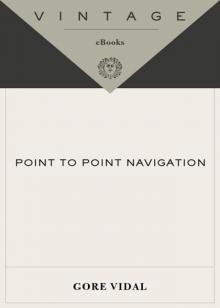 Point to Point Navigation
Point to Point Navigation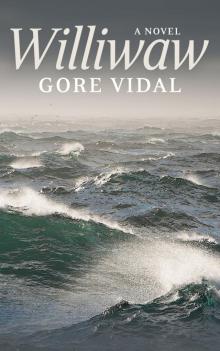 Williwaw
Williwaw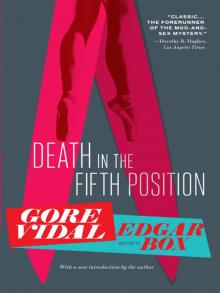 Death in the Fifth Position
Death in the Fifth Position In a Yellow Wood
In a Yellow Wood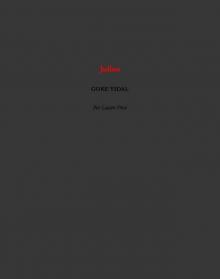 Julian
Julian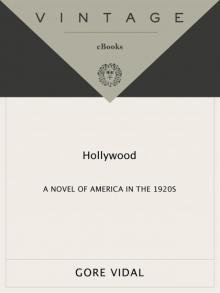 Hollywood
Hollywood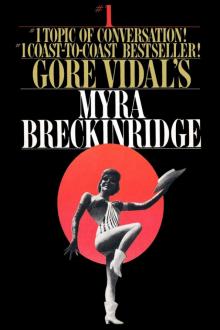 Myra Breckinridge
Myra Breckinridge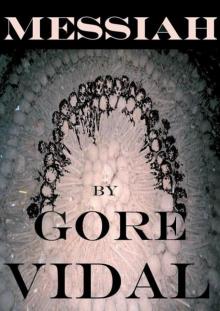 Messiah
Messiah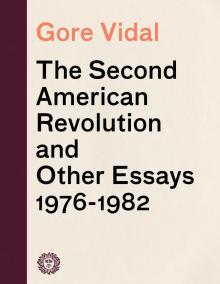 The Second American Revolution and Other Essays 1976--1982
The Second American Revolution and Other Essays 1976--1982 Homage to Daniel Shays
Homage to Daniel Shays Empire
Empire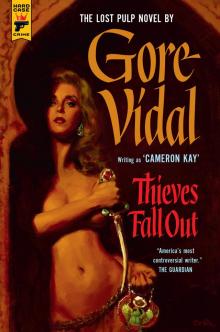 Thieves Fall Out
Thieves Fall Out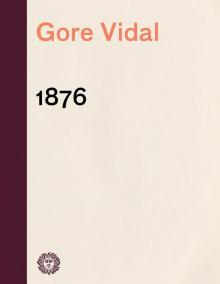 1876
1876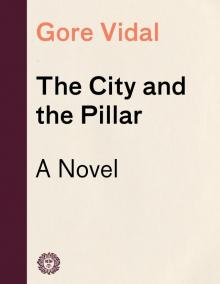 The City and the Pillar
The City and the Pillar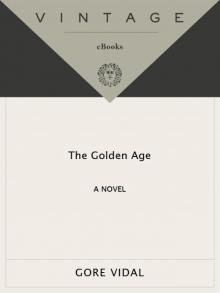 The Golden Age
The Golden Age At Home
At Home